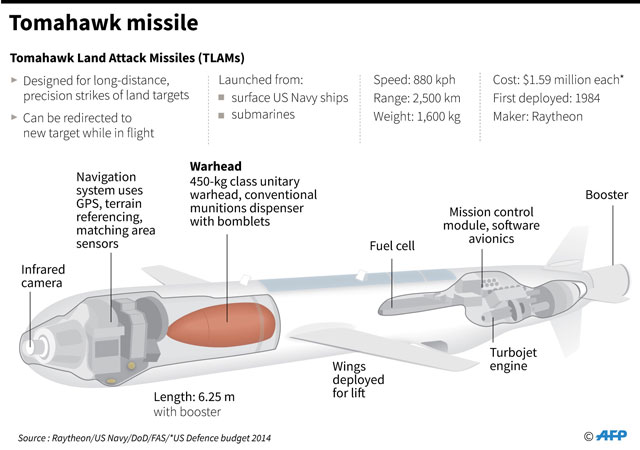
Washington, United States | AFP | President Donald Trump’s administration has made clear it sees Moscow as complicit in the latest suspected chemical weapons attack in Syria, but Pentagon planners are taking pains to avoid hitting Russian military assets.
A clash — intentional or otherwise — between the West and Russia in Syria could have disastrous consequences that could quickly flip the seven-year-old conflict in a new and dangerous direction.
According to General Joe Dunford, chairman of the Joint Chiefs of Staff, the strikes hit three targets related to Syrian President Bashar al-Assad’s chemical weapons program — a scientific research center near Damascus, a weapons storage facility west of Homs and a third location that contained both a command post and an equipment storage facility in the same area.
These targets appeared to steer well clear of any Russian military personnel or equipment.
“With regard to the Russian concerns, we specifically identified these targets to mitigate the risk of Russian forces being involved,” Dunford said.
In his primetime address announcing the strikes, Trump accused Russian President Vladimir Putin and his government of failing to guarantee a 2013 deal that was supposed to rid Assad of his chemical weapons.
“Assad’s recent attack — and today’s response — are the direct result of Russia’s failure to keep that promise,” Trump said.
But both Dunford and Defense Secretary Jim Mattis stressed that strikes were not intended to pull America deeper into Syria’s war.
“The targets tonight again were specifically designed to degrade the Syrian war machine’s ability to create chemical weapons and to set that back,” Mattis said.
“There were no attempts to broaden or expand that target set.”
– ‘Deconfliction’ –
Dunford noted that the US military did not coordinate any targets or any plans with the Russians ahead of Friday’s strikes, but he said a long-standing “deconfliction” line was used to tell Moscow the areas where the Americans, French and British would be conducting operations.
Communication on the line is a near-daily occurrence designed to stop mishaps as a US-led coalition conducts an air war against the Islamic State group while Russia pursues its own goals of propping up Assad.
But Moscow hardly needed a heads up that military action was coming.
On Wednesday, President Donald Trump tweeted that “nice and new and ‘smart!'” missiles would be coming Syria’s way, and that Russia should “get ready.”
He vacillated the next day after being criticized for telegraphing war plans, the very thing he had blasted his predecessor Barack Obama for, and insisted that no final decision had been made.
“Our relationship with Russia is worse now than it has ever been, and that includes the Cold War,” Trump tweeted on Wednesday.
Russia’s ambassador to the US, Anatoly Antonov, warned of unspecified repercussions after the strikes.
“We warned that such actions will not be left without consequences. All responsibility for them rests with Washington, London and Paris,” he said.
“Insulting the President of Russia is unacceptable and inadmissible,” added the envoy.
Russia has been deeply enmeshed in Syria’s civil war since 2015 and Washington and Moscow have already indirectly clashed in the country.
The outgoing head of the CIA, Mike Pompeo, this week appeared to confirm reports that around 200 Russian mercenaries were killed in February during a clash with US-led forces in Syria.
Media reports have suggested that Russian mercenaries working for the so-called “Wagner Group” were involved in the February battle.
Friday’s air strikes were limited in scope, lasting about an hour. Mattis said no additional attacks were planned, though Trump earlier suggested the strikes could last longer.
 The Independent Uganda: You get the Truth we Pay the Price
The Independent Uganda: You get the Truth we Pay the Price


